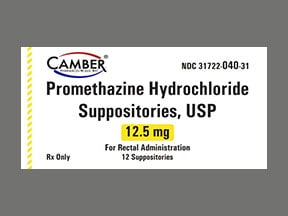
Promethegan Coupons & Savings Card – Discount Prices from $25.64
Brand for: Promethazine
My prescription
Edit
12.5MG, Promethazine (12 Suppositories)
Select pharmacy

CVS
$25.64
COUPON PRICE
Albertsons
$35.48
COUPON PRICE
Walgreens
$39.48
COUPON PRICE
Walmart
$44.07
COUPON PRICEPromethegan savings card
Show this card to your pharmacist
CVS
$25.64
BIN
ID
PCN
GRP
019876
LH74C6F94A
CHIPPO
LHX
Powered by
Related antihistamines prescriptions
More prescriptions for skin allergy
Related antihistamines prescriptions
More prescriptions for skin allergy
Price history for Promethegan (brand) & Promethazine (generic)
12 Suppositories, 12.5MG
Average retail price for Promethegan
Average retail price for Promethazine
Average SaveHealth price for Promethazine
Our price history data is based on aggregated prescription data collected from participating pharmacies in America. Our prescription data updates daily to reflect the latest price changes. If you notice a missing data point, it means there wasn't sufficient data available to generate a monetary value for that date.
Over the last 12 months, the average discount price of Promethegan is $33.27 using the SaveHealth savings card. That's an average savings of 66.72% on Promethegan with our discount card.
*Retail prices are based on pharmacy claims data, and may not be accurate when we don't have enough claims.
Promethegan (Promethazine) dosage forms
Dosage Quantity Price from Per unit 12.5MG 12 Suppositories $25.64 $2.14 12.5MG 1 Suppository $5.96 $5.96 12.5MG 2 Suppositories $9.43 $4.71 25MG 1 Suppository $5.25 $5.25 25MG 2 Suppositories $7.99 $4.00 25MG 4 Suppositories $13.48 $3.37 25MG 6 Suppositories $18.97 $3.16 25MG 12 Suppositories $25.64 $2.14
| Dosage | Quantity | Price from | Per unit |
|---|---|---|---|
| 12.5MG | 12 Suppositories | $25.64 | $2.14 |
| 12.5MG | 1 Suppository | $5.96 | $5.96 |
| 12.5MG | 2 Suppositories | $9.43 | $4.71 |
| 25MG | 1 Suppository | $5.25 | $5.25 |
| 25MG | 2 Suppositories | $7.99 | $4.00 |
| 25MG | 4 Suppositories | $13.48 | $3.37 |
| 25MG | 6 Suppositories | $18.97 | $3.16 |
| 25MG | 12 Suppositories | $25.64 | $2.14 |
What is Promethegan used for?
Promethegan is used to treat allergy symptoms, prevent motion sickness, and alleviate nausea and vomiting. It is also used as a sedative or sleep aid.
Is Promethegan the same as promethazine?
Yes, Promethegan is a brand name for the drug promethazine. Promethazine is an antihistamine used to treat allergy symptoms, nausea, and vomiting, among other conditions.
What is Promethegan suppository used for?
Promethegan suppository is used to treat nausea and vomiting. It is also used to relieve allergy symptoms such as itching, runny nose, and sneezing. Additionally, it can be used as a sedative or sleep aid, and to prevent motion sickness.
Is promethazine effective for nausea?
Yes, promethazine is effective for treating nausea. It is an antihistamine that is commonly used to relieve symptoms of nausea and vomiting. However, it is important for individuals to use it under the guidance of a healthcare professional, as it may have side effects and interactions with other medications.
What is another name for promethazine?
Another name for promethazine is Phenergan.
